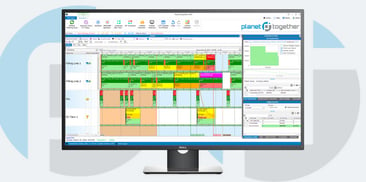Leveraging AI-Driven Insights for Optimizing Procurement Lead Times
As a Purchasing Manager, you understand the critical importance of optimizing procurement processes to ensure the timely delivery of raw materials and components for production. However, achieving optimal lead times can be a challenging task, especially in an industry with stringent regulations and complex supply chains.
Fortunately, advancements in technology, particularly in the realm of artificial intelligence (AI), offer promising solutions to streamline procurement operations and enhance overall efficiency. By harnessing AI-driven insights, pharmaceutical companies can gain a competitive edge by reducing lead times, minimizing inventory costs, and improving supply chain visibility.
In this blog, we'll explore how integration between PlanetTogether, a leading production planning software, and ERP, SCM, and MES systems such as SAP, Oracle, Microsoft, Kinaxis, and Aveva, can revolutionize procurement processes and drive greater operational efficiency.

Procurement Lead Times
Procurement lead times play a crucial role in pharmaceutical manufacturing, directly impacting production schedules, inventory levels, and ultimately, customer satisfaction. Lengthy lead times can result in production delays, stockouts, and increased carrying costs, all of which can have significant implications for the bottom line.
Furthermore, the complexity of pharmaceutical supply chains, which often involve multiple suppliers, regulatory requirements, and quality standards, adds another layer of challenge to the procurement process.
Traditionally, managing procurement lead times has relied heavily on manual processes and static planning methods, which are prone to errors and inefficiencies. However, with the advent of AI and advanced analytics, companies now have access to powerful tools that can analyze vast amounts of data in real-time, identify patterns and trends, and generate actionable insights to optimize procurement operations.

The Role of AI in Procurement Optimization
AI-driven insights offer a transformative approach to procurement optimization by leveraging machine learning algorithms to predict demand, anticipate supply chain disruptions, and optimize inventory levels. By integrating AI capabilities into production planning software like PlanetTogether and ERP, SCM, and MES systems, pharmaceutical companies can enhance their ability to make data-driven decisions and adapt to dynamic market conditions.
One of the key benefits of AI-driven procurement optimization is the ability to forecast demand with greater accuracy. By analyzing historical sales data, market trends, and other relevant factors, AI algorithms can generate more reliable demand forecasts, allowing purchasing managers to better anticipate future requirements and adjust procurement plans accordingly. This not only helps reduce the risk of stockouts but also minimizes the need for excess inventory, leading to cost savings and improved inventory turnover.
Furthermore, AI can play a critical role in supplier management by evaluating supplier performance, identifying potential risks, and optimizing sourcing strategies. By analyzing data from multiple sources, including supplier performance metrics, quality control reports, and market intelligence, AI algorithms can help identify the most reliable and cost-effective suppliers while mitigating risks associated with supply chain disruptions, quality issues, and regulatory compliance.

Integration with PlanetTogether and ERP, SCM, and MES Systems
The integration between PlanetTogether and leading ERP, SCM, and MES systems such as SAP, Oracle, Microsoft, Kinaxis, and Aveva is a game-changer for pharmaceutical companies looking to optimize procurement lead times. By combining advanced production planning capabilities with AI-driven insights from these systems, companies can achieve seamless coordination across the entire supply chain, from demand planning to procurement to production scheduling.
For example, integration with SAP's ERP system allows for real-time data exchange between PlanetTogether's production planning module and SAP's procurement and inventory management modules. This enables purchasing managers to access up-to-date information on inventory levels, supplier performance, and production schedules, allowing for more accurate demand forecasting and procurement planning.
Similarly, integration with Oracle's SCM Cloud provides pharmaceutical companies with end-to-end visibility and control over their supply chains, enabling them to optimize procurement lead times by streamlining processes, automating workflows, and leveraging AI-driven insights to make informed decisions.
Moreover, integration with Microsoft's Dynamics 365 Supply Chain Management offers advanced analytics capabilities, allowing companies to analyze data from multiple sources, including IoT sensors, RFID tags, and third-party databases, to gain deeper insights into their supply chain performance and identify areas for improvement.
Additionally, integration with Kinaxis's RapidResponse platform enables pharmaceutical companies to create dynamic supply chain models that can simulate various scenarios and evaluate the impact of different procurement strategies on lead times, costs, and inventory levels. This helps companies proactively identify risks and opportunities and adjust their procurement plans accordingly.
Furthermore, integration with Aveva's MES software enables real-time monitoring of production processes, allowing companies to identify bottlenecks, optimize resource allocation, and improve overall efficiency. By combining MES data with AI-driven insights from PlanetTogether and other ERP and SCM systems, companies can achieve greater visibility and control over their manufacturing operations, leading to reduced lead times and improved product quality.
Optimizing procurement lead times is essential for pharmaceutical companies seeking to remain competitive in today's rapidly evolving market. By harnessing the power of AI-driven insights and integrating advanced production planning software like PlanetTogether with ERP, SCM, and MES systems, companies can streamline procurement processes, reduce lead times, and enhance overall efficiency.
As a Purchasing Manager, embracing AI-driven procurement optimization represents a significant opportunity to drive tangible business outcomes, including cost savings, improved customer satisfaction, and greater competitive advantage. By leveraging the integration capabilities of leading software providers such as SAP, Oracle, Microsoft, Kinaxis, and Aveva, pharmaceutical companies can unlock new levels of agility, resilience, and innovation in their supply chain operations.
In the dynamic landscape of pharmaceutical manufacturing, the future belongs to those who embrace AI-driven insights and leverage them to optimize procurement lead times and drive sustainable growth. Are you ready to take your manufacturing operations to the next level? Contact us today to learn more about how PlanetTogether can help you achieve your goals and drive success in your industry.